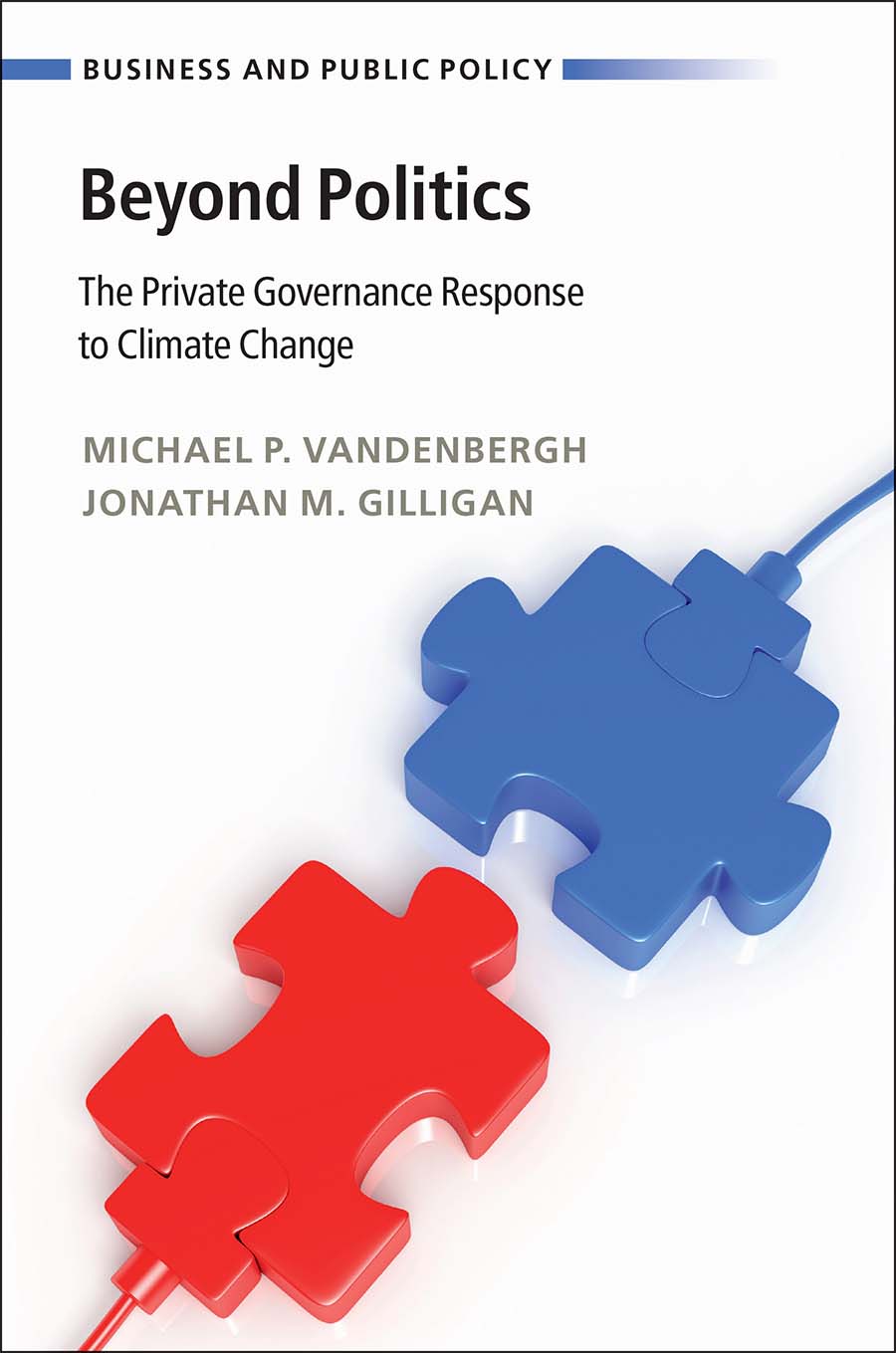Home » News » The Private Sector Response to Climate Change
The Private Sector Response to Climate Change
Posted by anderc8 on Friday, September 22, 2017 in News, TIPs 2015.
 Written by Alexander Maki, Michael Vandenbergh, Jonathan Gilligan & Mark Cohen
Written by Alexander Maki, Michael Vandenbergh, Jonathan Gilligan & Mark Cohen
Policy experts have proposed numerous approaches to mitigating climate change, from federal carbon taxes and power plant regulations to international agreements. Although many experts assume that climate change policy must come from government entities, our interdisciplinary research team has focused on an important development that has received less attention: the increase in climate mitigation efforts by private organizations. This private sector climate action entails private corporations acting alone and with other private organizations to perform the traditional government function of reducing a threat to the environment.
Human-caused climate change will likely lead to significant and harmful changes to the planet, but the response by international and national governments has not produced a global carbon emissions pathway that will achieve widely accepted temperature targets. Over the last decade, though, private organizations have taken the lead in addressing not only climate change, but also many other types of environmental issues. For example, the private sector has spurred organizations to purchase renewable power, require that their suppliers meet environmental standards, form organizations to develop new private standards for sustainable fisheries and forestry and even supply their own employees with discounts for home energy efficiency and new technologies, such as solar panels. Major technology companies have taken a leading role in some of these initiatives. Microsoft has enacted one of the most comprehensive private climate change approaches, adopting an internal carbon tax to reduce emissions and offsetting all of its remaining carbon emissions.

Law Professor Michael Vandenbergh
Our TIPS-funded research team is exploring a fascinating new form of private climate governance: private sector programs that offer “employee energy benefits” (EEBs). Organizations have increasingly focused on employee energy and environmental behaviors as part of their corporate environmental strategies. This is important because it is difficult to reach individual behavior through programs that target the 100 million-plus households in the United States. However, many corporations employ thousands of employees, so if EEB programs are effective, they can fill a large gap in the global response to climate change.
Although corporations have focused most of their attention on employee behavior in the workplace, some are also using EEBs to target employee energy behaviors in the home. Examples of EEBs include household energy efficiency information, rebates on home solar panels, discounts for hybrid vehicles and public transportation access and incentives. In a 2009 paper, we calculated that with non-intrusive, state-of-the-art programs the average household in the U.S. could adopt enough energy efficiency and conservation measures to reduce its carbon dioxide emissions by 20 percent, or 5.8 metric tons per year. Consider the implications of this for large employers: If Walmart employees were able to obtain this level of emission reductions (perhaps with the help of EEBs), the numbers imply that its 1.5 million employees in the United States could reduce their total emissions by 8.7 million metric tons of carbon dioxide per year, equal to the annual emissions of 300,000 American households.

Associate Professor of Earth & Environmental Sciences Jonathan Gilligan
Although EEBs have the potential to significantly influence employee environmental behaviors, little is known about them, such as who is offering them, what impact do they have on employees and what motivates employers to offer them and employees to participate in them. By drawing upon employer reports and conducting a survey of U.S. adults employed full-time, we found that these benefits were offered to 17 percent of employees, and included a vast array of strategies and approaches. Survey responses suggested employers were perceived to offer EEBs to maximize their competitive advantage and because of social responsibility concerns. We also found that EEBs were linked to employee environmental behavior and morale. This work suggests numerous lines of promising new research. Although the findings from this survey are not meant to be definitive, they demonstrate that a small but significant portion of U.S. full-time workers (likely 10 percent or more) are participating in these programs. They also suggest several fruitful areas for future research as well as the potential for a more targeted approach for employers considering offering EEBs.
We have also been exploring the role that private sector responses to climate change may play in public support for climate mitigation among groups of Americans typically resistant to such strategies. Given that 67 percent of Americans are concerned about the threat of big government, and only 26 percent about the threat of big business, highlighting the role of the federal government when discussing climate change mitigation may be ineffective. For example, even though a fair amount of support exists for many government-based climate change policies in the general public, political conservatives are far less likely to support actions such as the international Paris Climate Agreement or government-led efforts to regulate carbon. In the absence of broader support, actions by some states and local government will occur, but new federal government laws, policies and programs face dim prospects over the next several years. Private sector action may play an important role in addressing concerns among conservatives about climate mitigation efforts.

Professor of Law Mark Cohen
In an online study, we randomized individuals from across the country to reading about different types of climate change policies. Some people read about either the public governance strategy of government regulations (e.g., federal regulations targeting reductions in carbon emissions from power plants) or a federal carbon tax. Others were randomized to reading about private sector actions that companies are taking to reduce their carbon emissions. We found that reading about private sector action that targets climate mitigation, as compared to public governance approaches, led to increased support for private sector action and increased support for reducing carbon emissions, particularly among conservatives. This increased support occurred in part because conservatives perceived these approaches to be feasible and effective. Furthermore, the increased support did not lead to deceased support for public governance approaches.
Across all of our work, we find that one promising, and underexplored, route to meaningful reductions in carbon emissions is more deliberate consideration of private sector actions. In addition to scholarly articles, our interdisciplinary team has focused on outreach to undergraduate, graduate and professional students, and to the community. This research is also featured in a book that will be published this fall, Michael P. Vandenbergh & Jonathan M. Gilligan, Beyond Politics: The Private Governance Response to Climate Change (Cambridge University Press).
Additional links
Beyond Gridlock (winner of the 2017 Morrison Prize)
Private Environmental Governance
The Vanderbilt Climate Change Research Network
The Vanderbilt Institute for Energy and Environment
Conversation Op-ed:
Government Action is Not Enough, The Conversation
Reprinted as The Private Sector Can Cut Billions of Tons of Carbon, Salon.com
Reprinted as Government Action is Not Enough, Business Insider
Reprinted as Government Action is Not Enough, Huffington Post
2 Comments on “The Private Sector Response to Climate Change”
Julie on October 11th, 2017 at 1:10 pm
For most of the history of this country we have taken pride in being individuals. This is an excellent example of how personal responsibility could change the world in such a positive way, rather than waiting for “group think.”
Jake on February 26th, 2019 at 7:16 pm
We have a deep responsibility both collectively and individually to defeat climate change. It’s 2019 and still, the oil companies fight tooth and nail to keep new energy solutions from being created. We are stuck in the dinosaur ages with oil-based fuels. It’s time to wake up and put money back into new technology that will eliminate our dependencies on oil. We have wind, H2O and magnetic power options that could eliminate gas and restore our earth to its natural levels of carbon. We need to say no to gas. It’s that simple. We live in 2019 and yet are still stuck with old technology. As a web developer and tech guy, this makes me sick.
